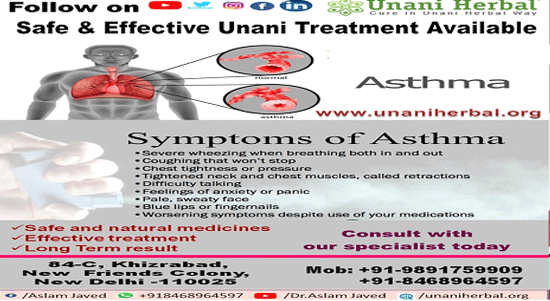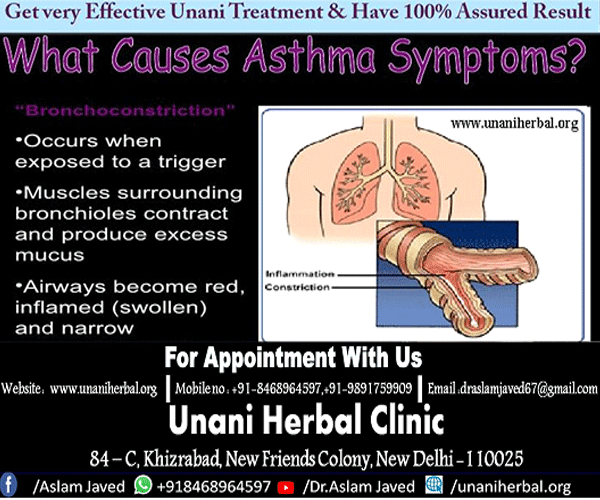Watch Health Mantra Live on Zee Salaam every Sunday at 11:30 am with Dr.Aslam Javed and know about your problems with him
To read the full article Treatment for Kidneys Failure
Dr.Aslam Javed

What is Asthma?

What is Asthma?
As per the World Health Organization or the WHO, Asthma is a condition 'characterized by recurrent attacks of breathlessness and wheezing, which vary in severity and frequency from person to person. This condition is due to inflammation of the air passages in the lungs and affects thesensitivity of the nerve endings in the airways so they become easily irritated. In an attack, the lining of the passages swell causing the airways to narrow and reducing the flow of air in and out of the lungs.' There are currently more than 3.5 crore asthmatics in India. Asthma is a condition with no known cures but whose symptoms can be effectively managed with the right treatment.
The symptoms of asthma include the following:

- A tight feeling in the chest
- Inability to breathe
- Coughing fits
- Wheezing fits
These symptoms can be experienced simultaneously and it is possible for an asthmaticto show one or two of the above symptoms at a time. The symptoms of asthma, as well as the exacerbation of one’s asthma, can be aused due to asthma triggers. An asthma trigger is anything that can intensify or bring about the symptoms of asthma
Asthma triggers can be classified into two categories
- Allergic triggers
- Non-allergic triggers
The allergic asthma triggers are as follows:
1. Dust Mites
Dust mites are insects that dwell in the corners of the house that are quite dusty. These insects can cause the immune system of the individual to overreact, thus resulting in the individual experiencing an asthma attack.
2. Cockroaches
Cockroaches are another insect that could result in the intensifying of the asthma symptoms. The shedding body parts of the insect, along with the faeces of the insect, trigger the asthma symptoms of the individual.
3. Pet Dander
Pet dander or the fur of pets can act as an asthma trigger and intensify the individual’s asthma symptoms leading to an asthma attack.
4. Mould
The mould that is present in the house can produce several allergens or toxic substances. When inhaled, these allergens can cause the hypersensitive airways to react negatively thus resulting in an asthma attack.
5. Smoke
Exposure to smoke of any kind (be it tobacco smoke, second-hand smoke, smoke caused by fire etc.) can irritate the airways of the individual which could lead to the intensification of the asthma symptoms and cause the individual to experience an asthma attack.
6. Perfume and Other Strong Odours
It is not uncommon for an individual’s asthma attacks to be triggered by different perfumes and strong fumes. This could be because of the particles that are released by the perfumes that could cause the airway of the individual to get irritated, resulting in the individual experiencing an asthma attack.
The main non-allergic asthma trigger is exercise.
Exercise, if not done correctly or in moderation can trigger an asthma attack. Typically, it requires about 4 to 6 minutes of moderately severe or severe continuous exercise to provoke the symptoms of asthma.
Severity of Asthma
Intermittent Asthma
For people suffering from intermittent asthma, the symptoms may usually occur fewer than two days a week, and there will be no difficulty in performing daily activities. Symptoms occurring at night can be rare. The spirometry and peak flow meter test will be 80% or more from the expected value and vary little normal when the person is not experiencing an asthma attack. The peak expiratory flow (PEF) varies less than 20% from morning to afternoon.
Mild Persistent Asthma
If a person has persistent asthma, the symptoms will be experienced often and these flare-ups can affect the performance of daily activities. Experiencing asthma symptoms at night can happen 2 to 4 times a month. Persistent asthma is severe as compared to intermittent asthma. Lung function test results in 80% or more of the expected value and might vary slightly (PEF varies 20% to 30%) from morning to afternoon.
Moderate Persistent Asthma
In this category, asthma symptomswill be experienced throughout the day. The night time symptoms occur more than once a week and flare-ups may interfere the performance of daily activities. The lung function test may result between 60% -80% of the expected result and the PEF varies more than 30% from morning to afternoon.
Severe Persistent Asthma
In severe persistent asthma, the symptoms can be experienced throughout the day, and it can be extremely difficult to carry out daily activities. The night time symptoms can almost occur every might. The lung function test would be abnormal, that is less than 60% of the expected result and PEF varies more than 30% from morning to evening.

Types of Asthma :
There are 12 major types of asthma which can be classified based on the severity of asthma symptoms. The types of asthma are as follows:
1. Nocturnal Asthma
Nocturnal Asthma refers to the type of asthma wherein the asthma symptoms get worse during the night-time. Night time asthma happens due to the activation of the parasympathetic system in the night time which causes bronchoconstriction. Frequent nocturnal symptoms are an indicator of poor asthma control.
2. Occupational Asthma
1 asthma case out of every 6 asthma cases is said to be occupational asthma. Industries that expose the workers to a number of irritants in large quantities put their employees at risk of developing occupational asthma.Within occupational asthma, inhaling high molecular weight proteins and low molecular weight chemicals are the main causes of the development of asthma. Irritants present in the workplace could also lead to the individual experiencing an asthma attack.
3. Exercise-Induced Asthma
Severe hyperpnea (increased rate and depth of breathing) in addition to exercise, diesel exhaust particles, nitro oxide, irritants and various other gases can result in hyper responsive airways which can lead to exercise-induced asthma. This type of asthma is mainly found in athletes and could also result in the injury of the epithelial caused due to poor breathing during long periods of strenuous exercise. The condition is usually also related to the dehydration of the airways of the individual.
4. Adult-Onset Asthma
Adult-Onset Asthma refers to the type of asthma wherein the asthma symptoms appear at a later age, generally between the ages of 12 - 65 years. This type of asthma is characterized by a poor prognosis, a severe and persistent airflow limitation and a faster decline in lung function. The major causes of adult-onset asthma include workplace irritants, environmental pollutants, hormonal changes respiratory infections, upper airway diseases, obesity, aspirin and paracetamol intake and stressful life events.
7. Cough Variant Asthma
While the symptoms of asthma usually include coughing, wheezing, shortness of breath and a tight feeling in the chest, individuals with cough variant asthma tend to have coughing as their major symptom of asthma.They also tend to experience a lack other asthma symptoms such as dyspnoea, wheezing, and a tight feeling in the chest and instead have a heightening cough reflex sensitivity with an unproductive cough.
8. Aspirin-induced Asthma
Aspirin-induced Asthma or Aspirin-Exacerbated Respiratory Disease
Aspirin-Exacerbated Respiratory Disease or AERD is a subtype of asthma that is manifested by a combination of adult-onset asthma, nasal polyposis, aspirin sensitivity and chronic rhinosinusitis. This type of asthma is experienced by 7% of the entire asthmatic population.
9. Obesity Induced Asthma
Obesity is a risk factor for asthma, which means that if a person is obese he or she has a higher risk than others to develop asthma. It plays a key role in the poor management of the condition. Recent studies have shown that weight gain and obesity tend to precede the condition, however, there is no proper conclusion drawn about how the two elements affect each other.
10. Neutrophilic Asthma
Neutrophilic Asthma is a type of asthma that is characterized by the excessive inflammation of the airways of the individual along with a disordered airway microbiome and an increase in the bacteria burden present in the airways. The presence of airway dysbiosis is what makes this type of asthma different from other types of asthma.
The types of asthma listed here can be overlapping due to the symptoms and their similar patterns. For example: Allergic asthma could have a nocturnal asthma component, which means a person suffering from allergic asthma can often experience worsening of symptoms at night and it might be difficult to classify this type of asthma.
Management of Asthma
Inhalation therapy is the most effective way to treat asthma. However, both inhalation medication & oral medication is available for asthma treatment.
1. Inhalation Therapy
This treatment route makes use of different types of inhalers to effectively manage your symptoms.Inhaled route helps to deliver the medicines directly to the lungs, which shows impact on symptoms quicker as compared to other methods of delivering medicines.It includes use of asthma inhalers and a machine called nebuliser that helps asthmatics to inhale medicines easily.
2. Oral medication
Oral medication for asthma includes oral pills and syrups, has more side effects than inhaled medication, as a larger dose is used. Oral medications have a slower onset of action and their action is not specific to lungs.
Causes

Allergies Can Cause Asthma
Allergies with asthma is a common problem. Eighty percent of people with asthma have allergies to things in the air, like tree, grass, and weed pollens; mold; animal dander; dust mites; and cockroach droppings. In one study, children with high levels of cockroach droppings in their homes were four times more likely to have childhood asthma than children with low levels. An allergy to dust mites is another common asthma trigger.
If you have asthma that’s hard to control, see an allergist to find out if you have allergies. Treating your allergies with medication and avoiding your triggers can help lower the odds of a severe asthma attack.
Food and Food Additives Trigger Asthma
Food allergies can cause mild to severe life-threatening reactions. They rarely cause asthma without other symptoms. If you have food allergies, asthma can be part of a severe, life-threatening reaction called anaphylaxis. The most common foods associated with allergic symptoms are:
Eggs
Cow's milk
Peanuts
Tree nuts
Soy
Wheat
Fish
Shrimp and other shellfish
Salads
Fresh fruits
Food preservatives can trigger isolated asthma, especially sulfite additives, like sodium bisulfite, potassium bisulfite, sodium metabisulfite, potassium metabisulfite, and sodium sulfite, which are commonly used in food processing or preparation.

Nomination form for 2020 Global Awards
https://www.unaniherbal.org/nomination-form.html
For Consultation click here
For more information you can also follow us on:
Copyright 2014 Unani Herbal
If you wish to cancel your subscription to this newsletter click here










